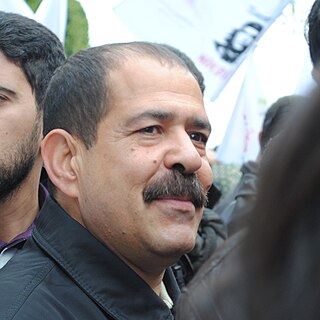Related Research Articles

Espérance Sportive de Tunis, known as ES Tunis or simply EST for short, is a Tunisian professional sports club based in Bab Souika neighbourhood of Tunis, Tunisia. The club was founded in 1919 and its traditional colours are red and yellow. Their home stadium, Stade Hammadi Agrebi, has a capacity of 60,000 spectators. The club is currently playing in the Tunisian Ligue Professionnelle 1. The club is mostly known for its football team.

Hammam-Lif is a coastal town about 20 km south-east of Tunis, the capital of Tunisia. It has been known since antiquity for its thermal springs originating in Mount Bou Kornine.
The Tunisian Combatant Group or TCG was a loose network of terrorists with connections to Al-Qaeda that was founded in 2000 and aspired to install an Islamist government in Tunisia. According to the United Nations Security Council (UNSC), TCG is believed to have had terrorist cells in France, Italy, Belgium, Luxembourg, the Netherlands and in the United Kingdom. By the 2010s, after its founders had been arrested and a long period of silence, it was not clear whether the group still existed.

The timeline of events in the War in Somalia during 2007 is set out below.
January 15, 2005 sieges were two raids of the Russian security forces on a militant Islamist group's safehouses in Daghestan. At least four Russian commandos and six rebels died in the clashes, while one was captured. The group, called Shariat Jamaat, previously killed 29 members of the Daghestani department for fighting extremism and criminal terrorism, including its chief Akhberdilav Akilov.

An Islamist insurgency is taking place in the Maghreb region of North Africa, followed on from the end of the Algerian Civil War in 2002. The Algerian militant group Salafist Group for Preaching and Combat (GSPC) allied itself with al-Qaeda to eventually become al-Qaeda in the Islamic Maghreb (AQIM). The Algerian and other Maghreb governments fighting the militants have worked with the United States and the United Kingdom since 2007, when Operation Enduring Freedom – Trans Sahara began.

The Somali civil war (2009–present) is the ongoing phase of the Somali civil war which is concentrated in southern and central Somalia. It began in late January 2009 with the present conflict mainly between the forces of the Federal Government of Somalia assisted by African Union peacekeeping troops and al-Shabaab militants who pledged alliegence to al-Qaeda during 2012.

The 2009 Boko Haram uprising was a conflict between Boko Haram, a militant Islamist group, and Nigerian security forces.

Al-Qaeda in the Lands of the Islamic Maghreb, or AQIM, is an Islamist militant organization that aims to overthrow the Algerian government and institute an Islamic state. To that end, it is currently engaged in an insurgency campaign in the Maghreb and Sahel regions.

Chokri Belaïd, also transliterated as Shokri Belaïd, was a Tunisian politician and lawyer who was an opposition leader with the left-secular Democratic Patriots' Movement. Belaïd was a vocal critic of the Ben Ali regime prior to the 2011 Tunisian revolution and of the then Islamist-led Tunisian government. On 6 February 2013, he was fatally shot outside his house in El Menzah, close to the Tunisian capital, Tunis. As a result of his assassination, Tunisian Prime Minister Hamadi Jebali announced his plan to dissolve the existing national government and to form a temporary "national unity" government.
A political crisis evolved in Tunisia following the assassination of leftist leader Mohamed Brahmi in late July 2013, during which the country's mainly secular opposition organized several protests against the ruling Troika alliance that was dominated by Rashid al-Ghannushi's Islamist Ennahda Movement. The events came as part of the aftermath of the Tunisian Revolution which ousted the country's longtime president Zine El Abidine Ben Ali, followed by a general election which saw Ennahda win a plurality alongside Moncef Marzouki's allied Congress for the Republic (CPR). The crisis gradually subsided when Prime Minister Ali Laarayedh resigned and a new constitution was adopted in January 2014.

The Libyan civil war (2014–2020), also more commonly known as the Second Libyan Civil War, was a multilateral civil war which was fought in Libya between a number of armed groups, but mainly the House of Representatives (HoR) and the Government of National Accord, for six years from 2014 to 2020.
The following lists events that happened in 2014 in Libya.

On 18 March 2015, two militants attacked the Bardo National Museum in the Tunisian capital city of Tunis, and took hostages. Twenty-one people, mostly European tourists, were killed at the scene, and an additional victim died ten days later. Around fifty others were injured. The two gunmen, Tunisian citizens Yassine Labidi and Saber Khachnaoui, were killed by police. Police treated the event as a terrorist attack.
The following lists events that happened during 2015 in the Tunisian Republic.
On 24 November 2015, a bus carrying Tunisian presidential guards exploded, killing 12, on a principal road in Tunis, Tunisia. ISIL claimed responsibility for the attack. The bomber, who also died in the attack, was identified as Houssem Abdelli.

The Islamic State Insurgency in Tunisia referred to the low–level militant and terror activity of the Islamic State branch in Tunisia from 2015 to 2022. The activity of the Islamic State (IS) in Tunisia began in June 2015, with the Sousse attacks, though an earlier terror incident in Bardo Museum in March 2015 was claimed by ISIL, while the Tunisian government blamed Okba Ibn Nafaa Brigade for the attack. Following massive border clashes near Ben Guerdane in March 2016, the activity of the IS group was described as an armed insurgency, switching from previous tactics of sporadic suicide attacks to attempts to gain territorial control. The armed insurgency was suppressed in 2022.

The Soliman Shooting is a violent incident which occurred on January 3, 2007 in the Tunisian region of Soliman, south-east of Tunis. The national police forces fought an armed group calling itself "Asad ibn al-Furat's army" which had been initially labeled by the government as "dangerous criminals". A previous shooting involving this same group had taken place on December 23, 2006 placing it in a context of jihadist terrorism and anarchist, insurgent, Islamist militancy.
In the 2016–17 season, Espérance Sportive de Tunis competed in the Ligue 1 for the 62nd season, as well as the Tunisian Cup. It was their 62nd consecutive season in the top flight of Tunisian football. They competed in Ligue 1, the Champions League and the Tunisian Cup.
In the 2021–22 season, Espérance Sportive de Tunis competed in the Ligue 1 for the 67th season, as well as the Tunisian Cup. It was their 67th consecutive season in the top flight of Tunisian football. They competed in Ligue 1, the Champions League, the Tunisian Cup, 2019–20 Tunisian Super Cup and the 2020–21 Tunisian Super Cup.
References
- 1 2 3 "Terror in the Maghreb". 14 February 2007.
- ↑ "Profile: Al-Qaeda in North Africa". BBC News. 17 January 2013.
- 1 2 3 Smith, Craig S. (14 January 2007). "Tunisia Says Suspects in Gun Battle Had Blueprints of Embassies". The New York Times.
- 1 2 "Archives". Los Angeles Times . 13 January 2007.
- ↑ Botha, Anneli (June 2008). "Chapter 4: Terrorism in Tunisia". Institute for Security Studies.
{{cite journal}}: Cite journal requires|journal=(help)